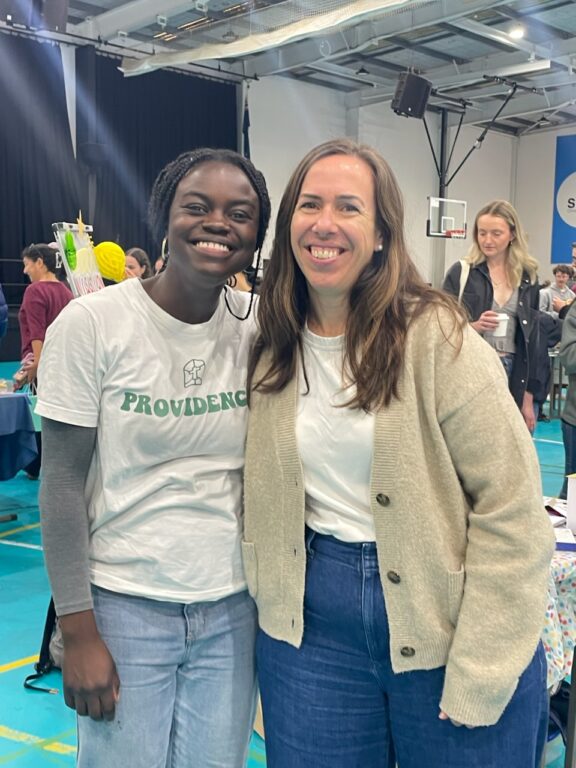
Amy and Apprentice Evelyn
Encouraged by her minister, Amy Stopher took the opportunity to move from volunteer to MTS apprentice in 2009 and hasn’t looked back.
Raised by believing parents, Amy can’t remember a time when she didn’t follow Jesus. She remembers as a young adult the joy and challenge of getting alongside her friends in Year 12 as they explored Christianity for themselves, and was discipled one-to-one by an MTS apprentice through Christian Union during her years at university. However, it wasn’t until being personally invited to try out MTS for herself in 2008 that Amy first considered vocational ministry.
Volunteer, Apprentice, Study, Vocation: Amy’s Path to Full-Time Ministry
After graduating from uni, Amy was an involved volunteer at church whilst loving her job as a high-school teacher. Ministry was something she did alongside work, but it wasn’t something she was pursuing as a career in itself.
Amy explains, “And then at some point the assistant minister at church said, oh, why don’t you just come and do an apprenticeship and then you can do ministry all the time!”
Apprenticing under Senior Minister Gordon Killow at Kallaroo Anglican Church in 2008 gave Amy a number of valuable ministry experiences that prepared her for life beyond theological study. She and Gordon launched a youth group, and Amy also led a women’s bible study group, taught Sunday school and met up with Gordon’s wife to read the Bible.
After two years doing MTS, Amy took a year’s leave without pay to study at Trinity Theological College, and said that’s when it finally clicked. “I was like, I wanna stay here…God is much bigger and more magnificent than I realised, and I can spend three years knowing him better, so I’m going to do that.”
Amy’s years at college also developed in her a passion for church ministry, which wasn’t a common path for women in Perth at the time. Despite that, God opened the right doors and Amy took up a position on staff at St Matthew’s Uni Church in 2012. She recalls, “There were like two women working in churches in Perth, and I got one of those jobs, which is kind of wild!”
Amy’s new church was already actively involved in raising up the next generation for ministry when she joined: “Our team was the pastor of Uni Church, an assistant [pastor], an [MTS] apprentice, and me… so yeah, I kind of joined a church that had [training and apprenticeships] in their DNA.
Church Planting and Building a Culture of Training
MTS training and church planting fell into Amy’s lap, so to speak. 18 months after Amy started at Uni Church, the ministry team there along with the whole congregation of young adults joined Providence City church as a new evening congregation. Amy took on her first MTS apprentice, Rebecca Antaw, at this point, who had six months left of her training from the time of the church merge. “She was not someone that I had recruited myself… it just kind of was happy timing… [it] was a delightful blessing.”
Amy continued to train a number of MTS apprentices until around 2019, when the church experienced a stem in the flow of apprentices. “We were beneficiaries of the work that had been done before us… [but after planting] we didn’t have any uni students of our own and we … didn’t have our own leadership pipeline.”
Though it took five to seven years to build up members and momentum, the church now has a thriving training culture. Amy shares, “And so now we have lots of university students and lots of young adults… and we’ve got a pathway for them to do ministry… we’ve got three apprentices and we’ll take on a couple more next year. So church is in a different kind of space!”
Training With the MTS Framework
Amy uses the MTS curriculum to train her current apprentice, Evelyn Domfeh. “We use the MTS framework of conviction, character, competence, and [use that to set] goals [and] where they’ll grow in those things.” Part of this training at Providence City looks like ensuring each apprentice has a dedicated trainer who checks in with them weekly.
Amy and Evelyn start their meetings by reading the Bible and praying together. After this they spend time chatting through whatever feels most relevant to Evelyn’s ministry that week, whether that’s an upcoming talk, a pastoral situation, or figuring out how to prioritise what’s on her plate. They also spend time setting goals and checking in regarding personal spiritual disciplines and godliness. Evelyn also has weekly meetings with her senior minister, attended by Amy and the other trainees at their church.
Raising Up Women
These days, Amy spends her time raising up others as part of her ministry role at Providence City church in Perth. “We’re scratching the surface of people in Perth… that’s kind of how we think about apprenticeships… we just have to raise up more and more people who can go and take the gospel to Perth and beyond.” Church ministry opportunities for women in Perth have really opened up since Amy finished college. “Now there are actually more jobs for women in churches than are able to be filled.”
Over the years, Amy has been involved in training several female apprentices, and she’s seen how the complexities of life often mean many women aren’t able or willing to take on full-time positions in churches.
Amy shares, “And so part of the conversation [with female apprentices] is like, what might the future look like? What are the ministry possibilities? How much college will you do? … And then … if she has children, how does that change what the path looks like? And how am I equipping her for whatever ministry will look like in the future, whether that’s in a formal ministry position, in a church or not?”
With the diversity of experience for women and the many hats they wear over their lifetime, Amy hopes that the time she spends training and equipping her apprentices will prepare them for a range of ministry opportunities.
Amy concludes, “To think about the original question… how am I training women to work in church? I think it’s wanting… to train her broadly, which I think the MTS framework gives you. Like thinking about conviction, character, competence… training her broadly to give her a range of skills that she can apply where she lands… I hope that by the end of her apprenticeship, she’ll have a broad enough set of skills that she’ll be able to apply in whatever situation she’s in.”
